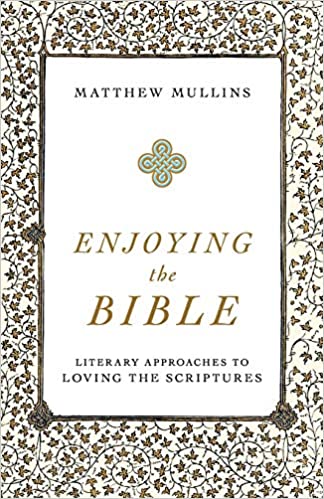A Book Review from Books At a Glance
by Andrew J. Spencer
If there is one thing that gets drilled into church-going Christians from a very young age, it is that they are supposed to read their Bibles on a regular basis. It is a duty and necessary for growth in godliness. But exhortations to regular Bible reading often implicitly present the intake of Scripture as a burden rather than a joy. Matthew Mullins’ recent book, Enjoying the Bible, takes a different tact by helping Christians thoroughly enjoy their time in the Word of God through a deeper understanding of the literary nature of Scripture.
Mullins is associate professor of English and History of Ideas at the College at Southeastern in Wake Forest, North Carolina. He uses his expertise in literary theory to encourage his readers into a deeper appreciation of the Bible. One of the basic ideas developed in this book is that if someone does not love poetry, they cannot fully appreciate the Bible. And yet, as Mullins argues, poetry is very often unappreciated as a literary form because its meaning is embedded in the whole experience of reading the poem rather than simply the bare words on the page. To understand the Psalms, as well as other poetry and narrative literature in the Bible, our imaginations must be shaped in a way that permits us to experience the full force of those literary forms, including their emotions.
This book begins with an introduction that demonstrates the widespread disinterest in poetry in our culture. Given the literary nature of Scripture, Mullins argues this negatively impacts our ability to read the Bible. In Chapter One he walks through the process by which reading literature became more about a quest for meaning than the experience of delighting in the artistry. The next chapter then explores the literary nature of the canon of Scripture, revealing that Scripture has propositional content that is often set within a literary medium. Its meaning, Mullins continues in Chapter Three, is more than a “TL;DR” summary of the propositional content, but includes the full experience invoked by the author’s words that communicate a common human experience of God across the ages.
To avoid an entirely reader-centric hermeneutic of Scripture, the fourth chapter outlines the limits of meaning, because while meaning may not be reducible to one simple bullet point per text, it is not so expansive as to be divorceable from the limits of the text itself. Chapter Five encourages reading Scripture for both its propositional content and its emotional experience as part of a full appreciation of the power of God’s Word. This approach leads to a greater delight in the inspired, inerrant text even as its content provides instruction, which is the exhortation of Chapter Six. In the seventh chapter, Mullins connects the practice of singing in worship with its embodied emotional and cognitive blend with the practice of trying to both understand and experience the content of Scripture.
The final five chapters shift from a more theoretical to a practical theme. In Chapter Eight, Mullins pleads with readers to change their approach to reading Scripture to include a more literary approach. Thus, the ninth chapter encourages reading for the general sense not just the nuggets of information. Chapter Ten recommends looking for the central emotion the author intended to invoke through Scripture. The eleventh chapter provides readers instructions on how better to understand the literary forms within the Bible to better comprehend the meaning of the text. Chapter Twelve provides a succinct overview of literary forms, augmenting the content of the previous chapter. Mullins concludes the book with the hope that readers will see the Bible as more than an instruction manual, will love it more deeply, and will expand their efforts to experience Scripture by learning to enjoy its literary qualities.
Enjoying the Bible is not a hermeneutics textbook, but it would make an excellent companion to many of the extant texts on the market. This is the sort of volume that would have helped me significantly as an undergraduate English major verbalize why I wanted to read Scripture as literature, while not treating it as merely literature. Mullins helpfully shows why shaping the Christian imagination to enjoy the beauty, wonder, and power of the Bible is an important part of discipleship. The cognitive content of Scripture should never be minimized, but neither should the value of the experience of being immersed in the inspired, inerrant text.
This book is an academic text. The best audience will be those familiar with the basics of literary theory or hermeneutics. Enjoying the Bible would make an excellent text for a “Bible as literature” course at the undergraduate level or as a source of encouragement for English majors in universities trying to reconcile the value of a literary approach to the Bible with its spiritual authority. This is a volume that can serve to encourage the weary seminary student or studious pastor whose need to produce a paper or sermon sometimes stifles a thoroughgoing delight in Scripture. This is a good book that will help many faithful, orthodox believers grow in their love of God and his Word.
Andrew J. Spencer (PhD, Southeastern Baptist Theological Seminary) lives in Monroe, MI. He is the editor of The Christian Mind of C.S. Lewis and frequently writes at EthicsAndCulture.com.
